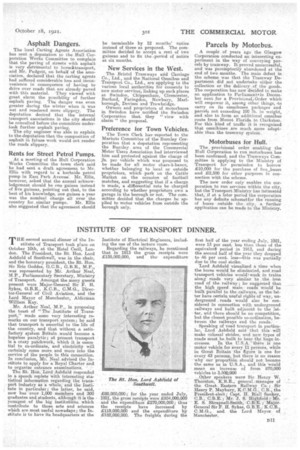INSTITUTE OF TRANSPORT DINNER.
Page 7

If you've noticed an error in this article please click here to report it so we can fix it.
THE second annual dinner of the Institute of Transport took place on October 10th, at the Hotel Cecil, London. The President, the Rt. Hon. Lord Ashfield of Sonthwell, was in the chair, and the honorary president, the Rt. Hon. Sir Erie Geddes, G.C.B. G.B.E., M.P. was represented by Mr. Arthur Neal, M.P., Parliamentary Secretary, Ministry of Transport. Amongst the many guests present were Major-General Sir F. H. Sykes, G.B.E., K.C.B. C.M.G., Director-General of Civil Aviation' and the Lord Mayor of Manchester, Alderirian William Kay.
Mr. Arthur Neal, M.P. in proposing the toast of "The Institlite of Transport," made sonic very interesting remarks on our transport system; he said that transport is essential to the life of the country, and that without a satisfactory system Britain would become a hopeless paralytic; at present transport is a crazy patchwork, which it is essential to co-ordinate, and electiloity will certainly come more and more into the service of the people in this connection. In conclusion Mr. Neal advised the Institute to apply for a Royal Charter and to organize entrance examinations.
The The Rt. 11On.'LardAshfield responded in a speech replete With interesting ita, tistical information regarding the trans.. port industry as a Whole, and the histi.: tote in particular • the latter:, he said, now has "over 1,00 inernhers and 300 graduates and students, although it is the • youngest of the big institutions which contribute to those arts and sciences which are most useful nowadays; the Institute is to have its headquarters at the
Institute of Electrical Engineers, including the use of the lecture room. Regarding the railways, he mentioned that in 1913 the gross receipts were £135,000,000, and the expenditure £88,000000; for the year ended July, 1981, the gross receipts were £254,000,000 and the expenditure £270,000,000; thus the receipts have increased by £119,000,000 and the expenditure by £182,000,000. The freights during the first half of the year ending July, 1921, were 13 per cent, less than those of the equivalent period in 1913, and during the second half of the year they dropped to 46 per cent. less—this was partially due to the coal strike.
'Lord. Ashfield visualized a time when the horse would be eliminated, and road transport vehicles would; work in trains along roads very similar to the, iron road of the railway ho suggested that the high speed. main roads Would be briilt Parallel to the.railways, as the latter have certain useful rights of way, underground . roads would alse be considered in connection with underground railways and built adjacent to the 'attar, and there should be no competition, but the closest possible co-ordination, between the railways and the roads.
• Speaking of -road transport in particular, -LOrd Ashfield said' that this will make colossal strides, and 'new' types of roads must be.built to bear the huge in creases. In. the U.S.A."there is one motor vehicle for every 11 persons, while in Great Britain the figure is one for every 43 persorit,,.but there islio reason why our proportitin_sheuldnot.. become the same as in U.S.A., and this Weald mean an increase of from 870,000 vehicles to 3,500,000 • • •• • • Other: speakers were Sir Henry W. Thornton, LB.E., generat-Manager of the Great Eastern Railway Co. ; Sir Henry P. Maylatiry--, K.C.M.G., C.B. the President-elect ; Capt. H. Riall Sankey, ;"Afr. T S Highfield; Mr. E. S.:Slirapiiell-Sniith;'•C:B.E.
General Sir F. H, Sykes, G.B.E.; K.C.B., C.M.G., and the Lord Mayor of Manchester.
































































